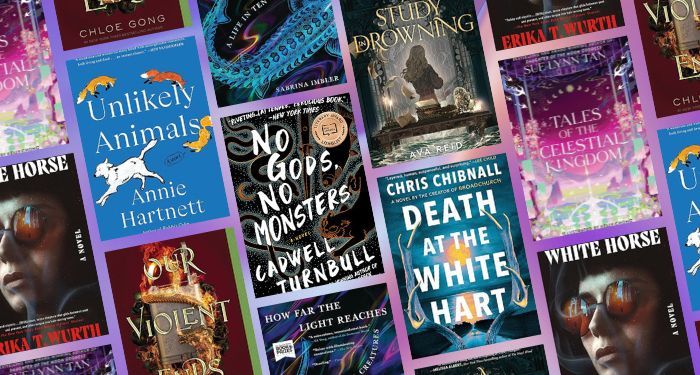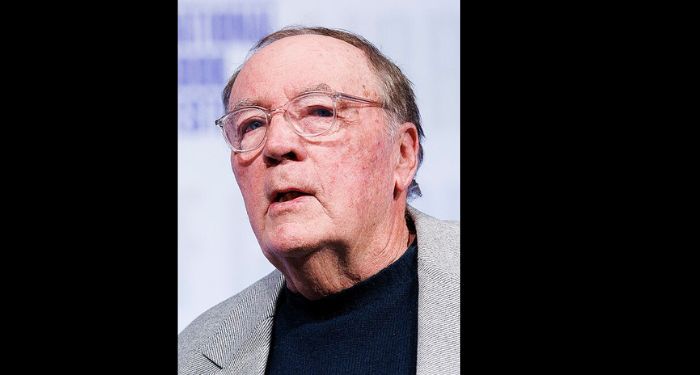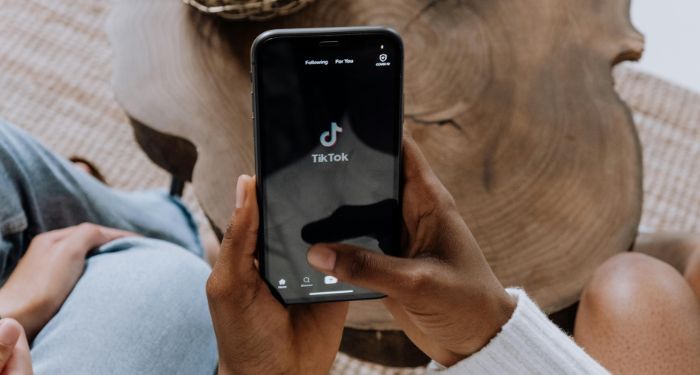The world is not kind to survivors. Kelly Sundberg has experienced the erasure, victim-blaming, and lack of justice that too many endure when speaking up about abuse. Following her debut memoir, Goodbye, Sweet Girl, about escaping an abusive marriage, Sundberg’s latest book, The Answer Is in the Wound, recounts the aftermath of this relationship as she battles post-traumatic stress disorder and fights to carve space for herself in a world that wants to silence her.
Though she was physically battered and emotionally wounded, Sundberg was not defeated by her marriage. She went on to publish her first book, earn a PhD, and raise a child as a single parent. The interconnected essays in The Answer Is in the Wound cover over a decade of healing, capturing the intense effort it took to survive. Sundberg shows readers what it looks like to rebuild a life, how trauma influences new relationships, and how troubling news stories appear all too familiar.
With a focus on lyrical forms, symbols, and repetition, the book is gut-wrenching, meditative, and vital. At times, the essays engage with prominent researchers in trauma psychology, weaving potent insights alongside Sundberg’s own experiences. Magic is a common theme of the book as Sundberg turns to crystals, tarot, and a psychic therapist with the desperate hope to alchemize her suffering. Similarly, this book is a form of magic. Despite suffering, it dares to offer hope.
I had the pleasure of speaking with the author about what is lost after trauma, the problem with being called “strong,” and what creativity looks like for her now.
Lizzie Lawson: Near the beginning of the book, you include an erasure poem composed of apology letters from your abusive ex-husband. For me, this opened a tension between the apology’s attempt to erase harm and the truth that comes through when parts of the apology are erased. Why did this feel like the right way to begin the book?
Kelly Sundberg: That’s a good way to describe it. When doing an erasure and thinking about publication, you have to transform the original material until it’s indecipherable. Publishing my ex-husband’s apologies in their full form would be illegal, and I wouldn’t have wanted to do that anyway. In the process of making the erasure, which I started as an intellectual experiment, I found that, although the language had been transformed, the essence of the apologies is the same. There was so much filler language within the apologies. When people are apologizing, particularly abusive people, they tend to go overboard and lavish praise on their victims. He would say things like, “you’re the most beautiful woman I’ve ever known,” which is such a cliché, but I’m human and susceptible to that.
The erasures kept the essence of the apologies but also made them more honest. The final line in the poem is “thank you for giving me you.” That wasn’t the line in the original letter, but that was what happened over the course of the relationship. I had been slowly erased. People could still look at me and know who I was, but I wasn’t the same. I never will be the same. That’s why parts of the erasure continue to show up throughout the collection. It shows that things in me were erased. They are gone. I’d like to say something more hopeful, like “you can capture these parts of yourself back,” but you can’t. Once some parts of yourself are gone, they’re just gone.
LL: The book returns to your hometown in rural Idaho and the time you spent in the wilderness as a young adult, revealing the origins of male violence in your life. One thing you attribute your healing to is getting out of your hometown. Was it always the plan for the book to return to Idaho?
KS: I can’t tell my story in any meaningful way without returning to Idaho. I love Idaho, but Idaho is a tough place. It was founded by people who went to the mountains because they wanted to be lawless, and that tradition has continued. When you see Idaho in the news, it’s oftentimes about white supremacy or the recent story about Teresa Borrenpohl, who was dragged out of a town hall meeting in Coeur d’Alene. A few years ago, I gave a keynote address at a domestic violence agency, and I was seated with the same sheriff who had her removed. He was aggressive with me because I talked about the response of the police when my ex-husband was arrested and he felt I was too critical of the police.
That’s a roundabout way of saying Idaho shaped who I was. Idaho has violence simmering under the surface. Male violence especially is excused, if not normalized. When I was in my twenties and going to bars with friends, it was not uncommon to see fist fights. As a woman, when you’re in a patriarchal place, the way you survive is by either making yourself invisible or hitching your wagon to patriarchy. I made myself invisible. When I talked about feeling erased in my marriage, it wasn’t unusual for me to feel that way because my childhood in Idaho was a system of self-erasure. If I was too assertive or too powerful, I’d invite aggression I didn’t want.
Idaho is one of the most beautiful places in the world geographically, but like a lot of beautiful places, it has a long history of exploitation, of the land and the people. I always thought I’d move back until recent years when our political climate became too much. I want to be clear though, there are also wonderful people in Idaho. The good people who last in Idaho are some of the best people you’ll meet.
LL: The book gently pushes back against people describing you as “strong” for surviving abuse. Could you talk more about that?
KS: People call me strong a lot. I get messages from people, and they call me strong. The reason I push back is because I don’t feel strong. I’m not sitting around in my daily life thinking I’m a strong person. I’m a vulnerable person. I’m tender. I’m prickly. I’m sensitive.
My childhood in Idaho was a system of self-erasure.
I survived my marriage not because I was strong, but because I had to. I didn’t have a choice. I wouldn’t call it strength as much as endurance. I kept going, and luckily there was light at the end of a very, very dark tunnel. It wasn’t strength that got me through it. It was a desire to stay alive.
When people tell me, “You’re so strong,” it feels like a lot to carry because they’re not seeing me for who I am. I want to be recognized as my real self, which is someone who’s vulnerable. I’m not weak, but in a lot of ways, I’m like an exposed nerve.
LL: Society has this idea of a perfect victim, one who doesn’t have flaws, doesn’t fight back, and doesn’t speak up. You wrote about this in relation to the media cycle around Amber Heard as well as the backlash you received for talking about your marriage. In one passage, you write, “It wasn’t leaving my abusive marriage that made me the problem. It was the act of speaking that made me the problem.” When writing the book, did you feel pressure to portray yourself a certain way?
KS: By the time I started this book, I was angry. I had no desire to present myself as the perfect victim. I also knew that was a kind of defiance. I knew there are going to be people who read the book and think, “maybe she deserved it.” In a Goodreads review of my first book, someone wrote, “I felt sorry for her husband.” I have lived with all kinds of things people say about survivors.
I’m not a perfect person. I can be mean. I try not to, but if I’m hurt, I can lash out. When I was married and my ex-husband was abusing me, I would fight back and say mean things, but that’s not mutual abuse. Mutual abuse is not a thing. Abuse is about one person having control over the other. After my marriage ended, my ex-husband told me I was mean to him too, and I responded, “But were you ever afraid of me?” He said no. That’s the difference. I was afraid for my life, and he was angry. Those are very different things.
I don’t know Amber Heard, obviously. I’m not defending her because I’m a fan. But the language that revolved around her felt recognizable. For example, Johnny Depp had a therapist diagnose her with borderline personality disorder, a diagnosis that is often weaponized against abused women. It’s straight out of the playbook. Complex PTSD can look like a personality disorder, but they’re not the same thing. My ex-husband claimed I had borderline personality disorder and therefore invited the abuse onto myself. My therapist swears I do not have it.
It was heartbreaking to me how many people believed that media narrative. I’d written Goodbye, Sweet Girl and other essays about domestic violence, wanting people to understand that violence happens in an ecosystem. When I saw the hate for Amber Heard, I thought, Why am I doing this? Because my work isn’t making a difference. I may have made a difference in some people’s lives, but now, watching the Diddy trial, I see people finding ways to blame Cassie. There’s never going to be a place in my lifetime where people don’t blame victims. I’ve had to come to terms with that.
LL: The book is made up of many short lyrical essays, and I admired their spiraling effect—how they circle around common themes, always adding something new. How did the structure come about?
KS: When I started writing, I realized the essays were inherently linked. I have a narrative voice that’s my own, and my experience hasn’t changed. I also wanted to find ways to describe the corporeal experience of living with post-traumatic stress disorder. I wanted the language to mimic this bodily experience. For example, when my PTSD was at its most activated, one of the things that I struggled with was hearing words people said to me, like incantations, repeating again and again. I wanted to use repetition in the essays to show how these voices became my own voice.
In a similar painful way, I wanted to show how my experience of time is circular. Having an event that fractures your psyche changes your relationship to time. There’s no way around it. I didn’t want to tell readers my relationship to time is different. I wanted to bring readers into that with me. There are moments where, for example, I was having experiences with my current partner, now husband, and I was simultaneously experiencing what had happened with my ex. It wasn’t a split personality. I knew it was my brain, but that didn’t make it easier.
LL: The essays often focus around symbols, like poppies for new life that springs up after a fire or the color red to represent rage. Do symbols help you find a way into the material?
I was afraid for my life, and he was angry. Those are very different things.
KS: Symbols helped me into the material because they help me in lived experience. This is probably why I became a writer, but I’ve always seen things in metaphor. One of the themes in the book is my clumsy attempts at magic. I’m not a practitioner of magic in any kind of professional way, but symbols and magic sort of go together.
When I attach meaning to a symbol, it brings comfort. Like the poppies. I’m comforted by the thought that this beauty comes from fires. The color red indicates anger to me in this overwhelming way. I wanted to share those with the reader. I don’t even know that I did it deliberately, but a lot of these images recur through multiple essays, not just in one or two pieces. They’ve become a sense of meaning-making for me.
LL: I appreciate your mention of the role magic and spirituality plays in the book. The book has a recurring psychic therapist and also deals with crystals, astrology, and tarot. What made you originally gravitate towards magic?
KS: I was raised in a religious family, and religion is a kind of magic. I lost religion around my late teens because my church was rigid, homophobic, and represented values I couldn’t identify with. Although I stopped believing, religion had meant a lot to me. It brought me comfort through a troubled childhood.
When I left my marriage, my therapist said, “you’re going to need to find something to fill the hole spiritually.” She made a pie chart with spaces for my family and friends, and she said, “what about spirituality? Where is that in the chart?” It was absent. I started gravitating towards magic out of fear. I guess there’s no other way to put it. I thought I could try and use magic to make my life better.
Magic is like prayer. Isn’t every prayer trying to create magic? I’m not sure how much of a believer I am, but what does it matter if it comforts me? I do believe in the psychic therapist though. She’s also a licensed therapist, and I wouldn’t be married now if I hadn’t found her. She got me through a lot of doubts, fears, and self-destructive tendencies.
LL: Near the end of the book, you reach a more stable place and talk about how difficult it was to finish the book because you no longer felt the same rawness and spiritual hunger. What does creativity look like to you now?
“Madwoman” is the Essential Novel About the Cycle of Domestic Abuse
Chelsea Bieker discusses the isolation of motherhood, which surfaces childhood trauma from past memory into present caretaking

KS: I don’t know. I’m still trying to figure that out. I love having this stable life, but so much of my creativity was motivated by pain. I wrote one of the first essays for this book when I was twenty-six, so this book’s been in process for a long time. I’ve changed so much throughout that process. Part of the reason it was a challenge to order the essays was because I had to find some way to structure this process of incredible growth over many years.
I don’t want to be maudlin, but pain was a motivator for me to be creative. Now that I’m happy, I’m not as motivated to be creative. I like watching bad television with my husband. Ten years ago at 11:00 p.m. on a Friday night, I used to be in my office writing with a candle. Now, it’s like, “Let’s watch Nine Perfect Strangers.”
My relationship with creativity is still unfolding. I finished the book in September, then Roxanne Gay and I did edits together, so it hasn’t been finished for that long. Since then, I’ve given myself permission to be a human for a while. We bought a house, and I’ve put my creative energy into designing my new kitchen. I have a novel I’m working on, but I wouldn’t say I’m working on it in any deep capacity. As writers, we put pressure on ourselves to be writing all the time, but it’s okay to take periods to just be a person. When I’m ready to get back to writing in a passionate way, I will. For now, I want to enjoy what I have in my life.
The post A Radical Memoir That Rejects the Idea of the Perfect Victim appeared first on Electric Literature.














 Bengali (Bangladesh) ·
Bengali (Bangladesh) ·  English (United States) ·
English (United States) ·